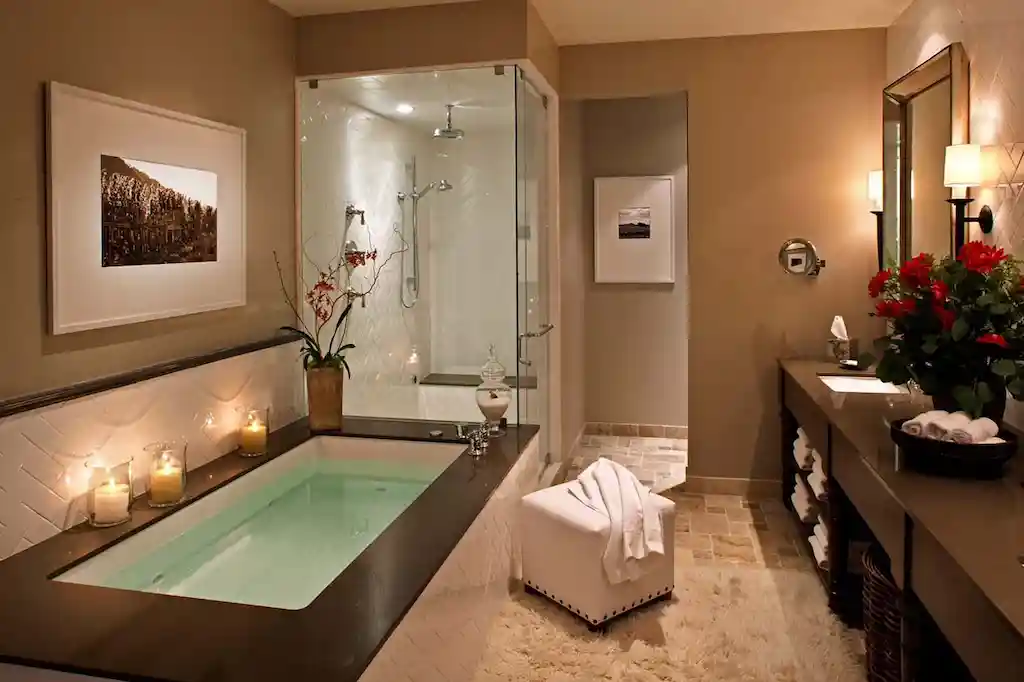Introduction to Hotels with Hot Tub in Rooms:
Definition of hotels with hot tub in room:
Hotels with hot tubs in the room, often referred to as “in-room hot tub accommodations,” are lodging establishments that offer guest rooms or suites equipped with private hot tubs or whirlpool baths directly integrated into the living space.
These hot tubs provide guests with the convenience and luxury of enjoying warm, bubbling water within the confines of their own accommodations, creating a unique and relaxing experience. The inclusion of in-room hot tubs aims to offer guests enhanced relaxation, privacy, and a personalized escape, making these accommodations particularly attractive to couples seeking romantic getaways, individuals looking for stress relief, and travellers in search of a more indulgent lodging experience.
Features And Benefits of Hotels With Hot Tubs In Rooms:
The purpose of the outlined exploration into the features and benefits of hotels with hot tubs in rooms is to provide a comprehensive understanding of the unique offerings and advantages that such accommodations provide. By delving into the features and benefits, this outline aims to:
Inform the Audience:
Educate readers about the concept of hotels with in-room hot tubs, ensuring they understand what sets these accommodations apart from traditional hotel options.
Highlight Relaxation and Wellness:
Emphasize the relaxation and wellness benefits that hot tubs offer, including stress relief, improved blood circulation, and the overall therapeutic experience.
Showcase Romantic Getaways:
Illuminate how hotels with hot tubs in room cater to couples seeking intimate and romantic experiences, enhancing the atmosphere and creating memorable moments.
Explain Room Designs and Technology:
Describe the various types of hot tubs available, how they are integrated into room layouts, and the technological enhancements that contribute to a comfortable and personalized experience.
Discuss Factors Influencing Choice:
Explore the factors travelers consider when choosing these accommodations, such as room types, pricing, location, and additional services, helping readers make informed decisions.
Feature Popular Destinations:
Present examples of notable hotels and destinations that offer in-room hot tubs, giving readers a starting point for their travel research.
Provide Considerations and Tips:
Offer practical advice for guests, including tips for booking, understanding hotel policies, and proper etiquette when using in-room hot tubs.
Encourage Exploration:
Stimulate interest in this unique form of lodging, encouraging readers to consider it for their future travel plans.
Overall, the outlined exploration aims to paint a comprehensive picture of the features and benefits of hotels with hot tubs in room, catering to a diverse audience seeking relaxation, romance, and a distinctive travel experience.
Benefits of Hotels with Hot Tub in Room:
The benefits of hotels with hot tubs in room are diverse and appealing, making them a sought-after choice for travelers seeking a unique and luxurious lodging experience. Here are some key benefits:
Relaxation and Stress Relief:
In-room hot tubs offer a private sanctuary for guests to unwind and alleviate stress. The warm water and soothing jets can relax tense muscles and promote a sense of calm and tranquility.
Privacy:
Unlike communal hot tubs found in shared spa areas, in-room hot tubs provide a high level of privacy. Guests can enjoy their hot tub experience without the presence of other travelers, enhancing relaxation.
Enhanced Wellness:
The therapeutic effects of hot tubs, including improved blood circulation and reduced muscle tension, contribute to guests’ overall wellness during their stay.
Scenic Views:
Some rooms are designed with hot tubs strategically placed to offer breathtaking views, whether it’s of city skylines, mountain ranges, or serene landscapes.
Memorable Experiences:
The unique nature of in-room hot tubs contributes to creating lasting memories for guests, making their stay more distinctive and enjoyable.
Year-Round Enjoyment:
In-room hot tubs are available regardless of the weather, enabling guests to enjoy the benefits of warm water and relaxation regardless of the season.
Social Distancing:
Especially in the context of the COVID-19 pandemic, in-room hot tubs offer a safe and socially distant way to enjoy hydrotherapy without shared spaces.
Flexibility:
Guests can choose to use the hot tub as they please, whether for a short soak before bed, a rejuvenating morning session, or any time in between.
Aesthetic Appeal:
The design and integration of hot tubs into room layouts can add aesthetic appeal to the overall ambiance of the accommodations.
Types of Hot Tubs:
There are several types of hot tubs available, each offering different features, benefits, and experiences. Here are some common types of hot tubs:
Standard Jetted Tub:
This is a basic type of hot tub that features water jets that provide a relaxing massage effect. These tubs are often found in many homes and hotels.
Whirlpool Tub:
Similar to jetted tubs, whirlpool tubs use water jets to create a massaging effect. They are designed to circulate water in a swirling motion, enhancing relaxation.
Soaking Tub:
Soaking tubs are deeper and wider than standard bathtubs. While they may not have jets, they offer a deep soak experience, allowing the bather to submerge and relax fully in warm water.
Air Jetted Tub:
Unlike water jetted tubs, air jetted tubs use air bubbles to create a gentler massage sensation. These tubs are known for their quieter operation and softer hydrotherapy experience.
Jacuzzi Tub:
“Jacuzzi” is often used as a synonym for hot tubs, but it originally referred to a brand that popularized the concept of hydrotherapy tubs with water jets. Jacuzzi tubs typically feature powerful jets for a vigorous massage experience.
Combination Tub:
Some hot tubs combine both water and air jets for a comprehensive hydrotherapy experience, allowing users to switch between different types of massages.
Infrared Hot Tub:
These hot tubs use infrared technology to provide heat therapy to the body. Infrared rays penetrate the skin, promoting relaxation and potentially providing additional health benefits.
Saltwater Hot Tub:
Rather than using traditional chlorine or bromine chemicals, saltwater hot tubs use a salt chlorine generator to produce natural chlorine from salt, resulting in gentler water that can be less harsh on the skin and eyes.
Wooden Hot Tub:
These tubs are made from wood and often have a more rustic or natural appearance. They can be heated using electricity, gas, or wood-fired heaters.
Portable Hot Tub:
Portable hot tubs are inflatable or easily movable tubs that can be set up indoors or outdoors. They are generally more affordable and versatile compared to permanent installations.
Hybrid Hot Tub:
These hot tubs combine features from different types, such as integrating water jets, air jets, and other therapeutic elements to create a versatile and customizable hydrotherapy experience.
It’s important to note that the availability of these types of hot tubs can vary based on the manufacturer, brand, and model. When choosing a hot tub, consider your preferences, budget, and the specific benefits you’re seeking from the hydrotherapy experience.
Integration of hot tub into room layout:
The integration of a hot tub into the room layout of hotels or accommodations is a crucial design aspect that contributes to the overall guest experience. Here are considerations for effectively integrating a hot tub into the room layout:
Strategic Placement:
Determine the best location for the hot tub within the room. Consider factors such as views, privacy, and ease of access. Placing the hot tub near a window with a scenic view or in a corner for enhanced privacy can be beneficial.
Spatial Flow:
Ensure that the placement of the hot tub doesn’t disrupt the overall flow of the room. Guests should be able to move around comfortably without feeling cramped.
Separation and Privacy:
If the hot tub area is separated from the rest of the room, consider using partitions, curtains, or sliding doors to create a sense of privacy. This is especially important for couples or guests seeking intimate experiences.
Aesthetic Integration:
Design the hot tub area to seamlessly blend with the room’s overall aesthetic. Use complementary materials, colors, and decor elements to create a harmonious look.
Lighting:
Incorporate ambient lighting around the hot tub to enhance the atmosphere. Dimmable lights or color-changing LED strips can create a relaxing ambiance.
Accessibility:
Ensure that the hot tub is easily accessible for guests. Consider factors such as step height, handrails, and ease of entry and exit.
Ventilation:
Proper ventilation is crucial to prevent excess humidity and moisture buildup. This helps maintain a comfortable environment and prevents potential issues like mold growth.
Safety:
Implement safety measures, such as non-slip surfaces around the hot tub, to prevent accidents.
Soundproofing:
If possible, incorporate soundproofing elements to minimize noise transfer between the hot tub area and the rest of the room.
Storage:
Include storage options for towels, robes, and other essentials nearby for convenience.
Integration with Other Amenities:
Consider how the hot tub area connects with other room amenities, such as seating areas, entertainment systems, or minibars.
Climate Control:
Ensure that the room’s temperature control extends to the hot tub area, so guests can enjoy the hot tub comfortably regardless of the external weather.
User-Friendly Controls:
Provide clear and user-friendly controls for the hot tub’s features, such as jets, temperature, and lighting.
Maintenance Accessibility:
Design the hot tub area to facilitate easy maintenance access without inconveniencing guests.
By carefully considering these factors, hotels can create a seamless and enjoyable experience for guests, integrating the hot tub into the room layout in a way that enhances relaxation, aesthetics, and overall comfort.
Listing of well-known hotels offering in-room hot tubs:
Shangri-La Hotel at The Shard:
La offers exceptional rooms with floor-to-ceiling windows, allowing guests to enjoy hot tubs while gazing at iconic London views.
Hotel Villa Honegg:
This Swiss retreat offers rooms with private balconies featuring outdoor hot tubs overlooking Lake Lucerne and the Swiss Alps.
Hotel Wailea:
USA This adults-only resort offers suites with private hot tubs and ocean views, providing a romantic escape on the beautiful island of Maui.
Hotel Café Royal:
Some of the suites at this historic hotel include hot tubs on private terraces, offering guests a luxurious way to unwind in the heart of London.
Frequently Asked Questions
What is a hotel room with a hot tub called?
A hotel room with a hot tub is often referred to as a “hot tub suite” or a “hot tub room.” This type of accommodation offers guests the luxury of a private in-room hot tub for relaxation and enjoyment during their stay.
Can you have a hot tub in a bedroom?
Yes, it’s possible to have a hot tub in a bedroom. Some luxury hotels and upscale accommodations offer this unique feature, creating a luxurious and intimate atmosphere. Careful design and proper installation ensure that the hot tub enhances the bedroom’s aesthetics while providing a relaxing experience.
What is the meaning of hot tub in hotel?
In a hotel context, a hot tub refers to a large, often heated, and jetted bathtub designed for relaxation and hydrotherapy. Hotels may offer rooms or suites with in-room hot tubs, providing guests with a private space to unwind and enjoy the soothing benefits of warm water and massaging jets.
Why do hotels not have hot tubs anymore?
Several factors might contribute to hotels not having hot tubs anymore. Maintenance costs, hygiene concerns, and changing guest preferences could influence this decision. Some hotels prioritize more versatile amenities. Additionally, space limitations and regulatory requirements might impact the feasibility of offering hot tubs in certain properties.







